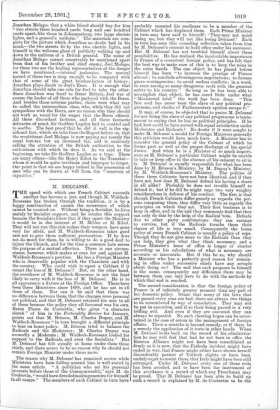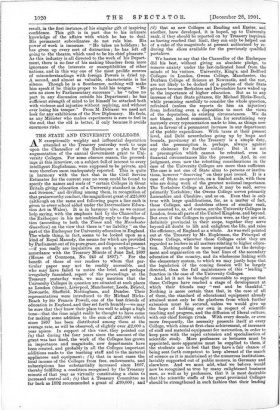M. DELCASSE. T HE speed with which one French Cabinet succeeds
another has become a jest, and though M. Waldeck- Rousseau has broken through the tradition, it is by a happy combination of causes the recurrence of which cannot be counted on. Without being a Socialist, he lives mainly by Socialist support, and he retains this support because the Socialists know that if they upset the Ministry it would be in the interest of M. Maine or M. Ribot. They will not run this risk unless their tempers have gone very fax afield, and M. Waldeck-Rousseau takes good care not to give them sufficient provocation. If he does not do much for them, he is willing to do a good deal to injure the Church, and. for the time a common hate serves the purpose of a mutual affection. There is one circum- stance, however, which makes at once for and against M. Waldeck-Rousseau's position. He has a Foreign Minister who is deservedly popular with the Chambers and with the country. Who could wish to upset a Cabinet if it meant the loss of M. Delcasse ? But, on the other hand, the overthrow of M. Waldeck-Rousseau is not the least likely to carry with it the loss of M. Delcasse. He is to all appearance a fixture at the Foreign Office. There have been three Ministries since 1898, and• he has sat in all three of them. Nor can it be said that there was no difference between them, that the changes were personal not political, and that M. Delcasse retained his seat in all of them because the policy they all favoured was his own. Baron Pierre de Coubertin, who gives "a character sketch" of him in the Fortnightly Review for January, points out that M. Brisson, M. Charles Dupuy, and M. Waldeck-Rousseau "in turn brought a different principle to bear on home policy. M. Brisson tried to balance the Radicals and the Moderates ; M. Charles Dupuy was avowedly a Moderate ; M. Waldeck-Rousseau looked for support to the Radicals, and even the Socialists." But M. Delcass6 has felt equally at home under these three chiefs, and there seems to be no reason why he should not remain Foreign Minister under three more.
The reason why M. Delcasse has remained secure while Ministries have been falling around him is well stated in the same article. "A politician who set his personal interests before those of the Commonwealth," says M. de Coubertin, "would have dreaded makingenemies for himself in all camps." The members of each Cabinet in turn have probably resented his readiness to be a member of the Cabinet which has displaced them. Each Prime Minister in turn may have said to himself : 'They may not mind losing me, but they will not like losing Delcassd.' Each in turn has seen this consoling reflection taken from him by M. Delcasse's consent to hold office under his successor. But M. Delcass6 has not troubled himself about these possibilities. He has realised the incalculable importance to France of a consistent foreign policy, and has felt that the best way to make sure of this is to keep the reins in the same hands. The one object he has placed before himself has been "to increase the prestige of France abroad ; to conclude advantageous negotiations ; to foresee grave contingencies ; to avoid useless conflicts ; in a word, to steer among so many dangerous reefs with the greatest safety to his country.' So long as he has been able to accomplish that object, he has cared little under what "Ministerial label" the work has been done. "This free soul has never been the slave of any political pro- gramme, and shades of Parliamentary opinion escape it."
It may, of course, be objected that to praise M. Delcass6 for not being the slave of any political programme is tanta- mount to saying that he has no political principles. If he had, how could he have served with equal satisfaction under Moderates and Radicals ? No doubt if it were sought to make M. Delcassd a model for Foreign Ministers generally this criticism would have much force. A Minister has to consider the general policy of the Cabinet of which he forms part as well as the proper discharge of his special duties. And when he is a Minister of so much import- ance as M. Delcass6 a particular Cabinet might be unable to take or keep office in the absence of his consent to sit in it. M. Delcasse is equally responsible for what has been done by M. Brisson's Ministry, by M. Dupuy's Ministry, by M. Waldeck-Rousseau's Ministry. The policies of these three Cabinets have not been identical, and if they have not, how does M. Delcass6 defend his having a share in all alike ? Probably he does not trouble himself to defend it ; but if he did he might urge two very weighty considerations in defence of his conduct. The first is that though French Cabinets differ greatly as regards the per- sons composing them, they differ very little as regards the principles on which they act. Their first business is to keep in office, and in the end they commonly find that they can only do this by the help of the Radical vote. Defeats due to other party combinations they can manage to survive, but if the Radicals forsake them their chance of life is very small. Consequently the home policy of every French Cabinet is usually a policy of sops. Though they do not give more to the Radicals than they can help, they give what they think necessary, and a Prime Minister's lease of office is longer or shorter according as his calculations of what is necessary are accurate or inaccurate. But if this be so, why should a Minister who has a perfectly good reason for remain- ing in office under successive chiefs have any scruple about doing so? The end that each proposes to himself is the same, consequently any difference there• may be between them can only have to do with the methods by which that end is reached.
The second consideration is that the foreign policy of France is of infinitely greater moment than any part of her domestic policy. Grant that many of the laws that are passed every year are bad, there are always two things to be remembered by way of consolation. They may not be put in execution, and if so their being passed is a very trifling evil. And even if they are executed they can always be repealed. No such cheering hopes can be enter- tained in the case of errors in the management of foreign • affairs. There a mistake is beyond remedy, or if there be a remedy the application of it rests in other hands. When M. Delcassd looks back on the record of his administra- 'tion he may well feel that had he not been in office the • Russian Alliance might not have been consolidated as *firmly as it is now, that the Fashoda incident might have ended in war, that France might either have shown herself discreditably patient of Turkish slights or have been unduly eager to resent them, that Italy might have been still estranged. Under M. Delcassd every one of these evils has been avoided, and to have been the instrument of this avoidance is a record of which any Frenchman may be proud. That M. Delcassd has been able to build up such a record is explained by M. de Coubertin to be the result, in the first instance, of his singular gift of inspiring confidence. This gift is in part due to his intimate knowledge of the affairs with which he has to deal. His permanent subordinates do not rule him. His power of work is immense. "He takes no holidays ; he has given up every sort of distraction ; he has left off going to the theatre, which used to be his chief pleasure." As this industry is all directed to the work of his Depart- ment, there is no fear of his making blunders from mere ignorance of the interests or susceptibilities of other nations, and, in this way one of the most prolific sources of misunderstandings with foreign Powers is dried up. A second, and almost as valuable, characteristic is his silence. Though he is a Southerner, nothing will make him speak if he thinks proper to hold his tongue. "He sets no store by Parliamentary successes " ; he "takes no part in any discussion outside his Department ; he has sufficient strength of mind to let himself be attacked both with violence and injustice without replying, and without ever losing his temper." From M. Delcasse we need not look for any exhibitions of the New Diplomacy. He feels, as any Minister who makes experiments is sure to feel in the end, that the old is better, if only because it avoids enormous risks.



































 Previous page
Previous page